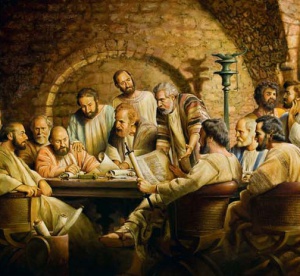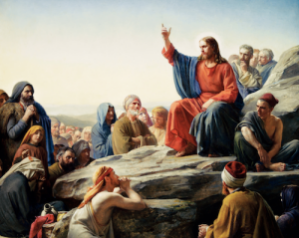Q: Did the apostle Paul go to Jerusalem in order to consult with the Governing Body about the circumcision issue? I once heard a talk by Fred Franz where he presented scriptural evidence that there was no GB in Jerusalem. The information he presented was very convincing. Have you heard about that talk? I would be interested in your comments.
A: The Society claims that there existed a governing body in Jerusalem, made up of the apostles and older men who exercised authority over all the congregations throughout the Roman Empire. As evidence they like to refer to what happened when the matter of circumcision became an issue for the Gentile Christians and the apostles and older men ruled on the matter with the help of the holy spirit. This is what Insight on the Scriptures says on this:
Organization of the Christian Congregation. While Christian congregations of God were established in various places, they did not function independently of one another. Instead, they all recognized the authority of the Christian governing body at Jerusalem. This governing body was comprised of the apostles and older men of the Jerusalem congregation, there being no rival bodies elsewhere seeking to supervise the congregation. It was to the faithful Christian governing body of the first century C.E. that the issue of circumcision was submitted for consideration. When the governing body made its decision, as directed by the holy spirit, that decision was accepted and became binding upon all Christian congregations, these willingly submitting to it.— Ac 15:22-31. — it-1 pp. 498-499 Congregation
Was the matter of circumcision taken to Jerusalem because there was a “governing body” there? The apostle Paul and Barnabas had been appointed to preach to the nations, not by any governing body in Jerusalem, but directly by holy spirit. (Acts 13:2-4) Jehovah had been blessing their preaching work among the Gentiles so that many congregations were being formed. Now a problem arose. What does the account in Acts tell us?
And certain men came down from Judea and began to teach the brothers: “Unless YOU get circumcised according to the custom of Moses, YOU cannot be saved.” But when there had occurred no little dissension and disputing by Paul and Barnabas with them, they arranged for Paul and Barnabas and some others of them to go up to the apostles and older men in Jerusalem regarding this dispute. Accordingly, after being conducted partway by the congregation, these men continued on their way through both Phoenicia and Samaria, relating in detail the conversion of people of the nations, and they were causing great joy to all the brothers. On arriving in Jerusalem they were kindly received by the congregation and the apostles and the older men, and they recounted the many things God had done by means of them. Yet, some of those of the sect of the Pharisees that had believed rose up from their seats and said: “It is necessary to circumcise them and charge them to observe the law of Moses.” — Acts 15:1-5
Notice where the problem originated! Certain men from Judea, the Jerusalem congregation, were visiting the Gentile brothers in Antioch, Syria and Cilicia, causing them and the apostle Paul and Barnabas much trouble by insisting that they, people of the nations, needed to be circumcised and observe the law of Moses. As the apostles and older men acknowledged, “some from among us have caused you trouble with speeches, trying to subvert your souls, although we did not give them any instructions.” (Acts 15:23,24) The problem needed to be dealt with at the source. If there was a governing body in Jerusalem then they were part of the problem.
Jehovah had provided clear evidence by “the many signs and portents” that he did through Paul and Barnabas among people of the nations, that he was accepting them with no need for circumcision or observing the law of Moses. Because of relating their experiences, and the testimony of Peter and James, the holy spirit enabled them to come to a unanimous decision. This decision was then sent to all the congregations that had been affected by the trouble makers. There is no evidence here of a governing body that supervised all the congregations. The account in Acts simply states that a problem arose in Jerusalem that was exported to the brothers in other areas and it was handled by those where the problem originated, as it should be.
It is noteworthy that the apostle Peter (Cephas) and James (Jesus’ half brother) were instrumental in being used to settle the circumcision issue. Perhaps the holy spirit chose those two men because it seems that they may well have been part of the problem. This is evident in what Paul wrote in his letter to the Galatians.
However, when Cephas came to Antioch, I resisted him face to face, because he stood condemned. For before the arrival of certain men from James, he used to eat with people of the nations; but when they arrived, he went withdrawing and separating himself, in fear of those of the circumcised class. The rest of the Jews also joined him in putting on this pretense, so that even Barnabas was led along with them in their pretense. — Galatians 2:11-14
Paul had to severely criticize Peter before all the brothers “because he stood condemned” for his hypocritical attitude toward the uncircumcised people of the nations, which was affecting the other brothers in Antioch, including Paul’s companion Barnabas. Peter himself was influenced in this by the men from James. And this even after the circumcision issue had been settled. Yes, even after Jehovah had sent Peter to the uncircumcised army officer of the Italian band, Cornelius years earlier, and he saw the holy spirit fall upon him and those with him, he still had a problem in having God's view on matters. (Acts chapter 10) Because of Peter’s influence “[the brothers] were not walking straight according to the truth of the good news.” He had become a danger of corrupting the brothers and was causing division. To Peter's credit, he allowed himself to be corrected.
There is no evidence at all to suggest that any of the apostles or older men in the Jerusalem congregation, as a governing body, supervised any other congregations outside their district. If anything, they sometimes contributed to the problems of the brothers in other areas when they meddled in their affairs. And there certainly is no evidence that Jesus ever acknowledged a governing body. He himself appointed Saul to become the apostle Paul, and he dealt with each individual congregation also personally, such as when he wrote his letters to the seven congregations in Asia Minor. – Acts 9:3-19; Rev. 1:10,11; 2:1-3:22



